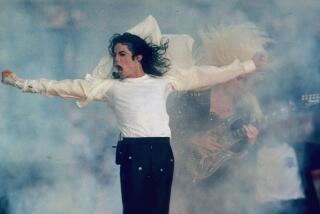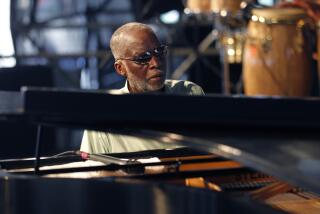JAZZ REVIEW : MJQ: It’s Modern With a Few Moths
- Share via
Where is the M in the MJQ?
Thursday evening, at the Ambassador Auditorium in Pasadena, John Lewis took his Modern Jazz Quartet through a program of music so impeccable in its craftsmanship, and so set in its long popular ways, that it seems curmudgeonly to complain.
If jazz is, as has often been said, the sound of surprise, this group, comprising the same four men who faced the public together in 1955, is the antithesis: the sound of no surprises. Lewis is a composer whose skill is beyond question; some of his works, such as “Django,” have shown a good shelf life. But the problem of predictability is a nagging constant.
Whatever spontaneity could be discerned was largely due to the solos of Milt Jackson, but anyone who has heard him leading his own quartet (with Cedar Walton, Billy Higgins and John Clayton) knows that in that setting he truly came alive, whereas in this format he is largely under wraps.
Jackson even cleaned up Gershwin’s Uncle Tom grammar by announcing “Bess You Are My Woman Now.” One almost expected to hear it followed by “It Doesn’t Mean a Thing If It Hasn’t Got That Swing.”
This sense of propriety governed the music itself. The first half consisted largely of pieces from the group’s Ellington album, with Lewis solemnly turning pages of manuscript paper as if he hadn’t been through these motions a thousand times before.
A new Lewis work, “The Majesty of the Sun,” was typically well designed, but the “explosions” referred to in his announcement never arrived; one listened in vain for a hint of solar energy.
The three-part suite “A Day in Dubrovnik” brought a greater measure of interest, as did the encore, Charlie Parker’s “Confirmation,” one of the few pieces that had the quartet loosening up, with Percy Heath’s bass and Connie Kay’s drums in a more propulsive groove.
John Lewis needs a radical change of setting. In the context of the 1990s, for all his academic excellence, the MJQ is an anachronism. A more orchestral canvas might be the answer. One hates to see the evening sun go down on a group that was, in its day, a vital force in generating enthusiasm and respect for its innovation.
More to Read
The biggest entertainment stories
Get our big stories about Hollywood, film, television, music, arts, culture and more right in your inbox as soon as they publish.
You may occasionally receive promotional content from the Los Angeles Times.










